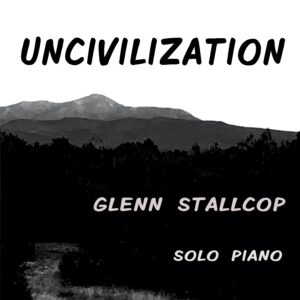Glenn Stallcop Composer, Performer


Dissolve and Disengage
I am certainly not the only person seriously concerned about the climate during the last several decades. I remember being aboard the push for solar power in the Carter administration, reading about Deep Ecology in the 1980’s, following the foundation and spread of the Greens, Al Gore’s crusade, etc. As Climate Change has now become a forgone conclusion, I have started to think seriously about the many possible human crises that are lurking in our not so distant future. The mass migration of humanity away from affected areas, the flooding, the fires, the droughts and famine, the stark division of society into haves and have nots, the continuous assault of tragedy upon tragedy, essentially, the disintegration of civilization as we know it.
I put together this album and wanted to call it Uncivilization, which seemed to sum up the sense of foreboding and fragmentation surrounding this rather dystopian vision. As I do with all titles, I ran an internet search and found that Uncivilization was the name given to a document titled The Dark Mountain Manifesto published in 2009 by Paul Kingsnorth and Dougald Hine, which is the founding document of the Dark Mountain Project. This organization accepts the collapse of civilization, tries to understand the consequences, and entertains possible paths of survival. As they say, instead of putting blind faith in possible solutions that will keep us from falling, perhaps we should dare to look over the edge.
The primary effort of Dark Mountain, which started in Europe but whose influence has expanded much beyond, is to try to change the narrative of progress and our sense of entitlement. They have published two journals of prose and artwork annually that embrace a wide collection of research, opinion, stories, and imaginative fancy. It is well worth reading.
The possible directions this crisis could take are many, but the crisis itself is real. The fossil fuel we burn through every day took thousands of years of solar power to produce. The thought that we could replace that with the solar energy we receive in one day is fanciful at best. And even if we can replace some of the lost energy and make adjustments for the energy we cannot replace, the environmental overhaul has already been set in motion. We are not only not ready, we don’t even believe it.
This album focuses on the loss and the upheaval. I try not to focus too much on the tragedy, the violence, starvation, and death. Even if we deal with the humanitarian problems in humane and intelligent ways, the suffering and upheaval will be mind boggling, even for the entitled.
DISSOLVE AND DISENGAGE
I am certainly not the only person seriously concerned about the climate during the last several decades. I remember being aboard the push for solar power in the Carter administration, reading about Deep Ecology in the 1980’s, following the foundation and spread of the Greens, Al Gore’s crusade, etc. As Climate Change has now become a forgone conclusion, I have started to think seriously about the many possible human crises that are lurking in our not so distant future. The mass migration of humanity away from affected areas, the flooding, the fires, the droughts and famine, the stark division of society into haves and have nots, the continuous assault of tragedy upon tragedy, essentially, the disintegration of civilization as we know it.
I put together this album and wanted to call it Uncivilization, which seemed to sum up the sense of foreboding and fragmentation surrounding this rather dystopian vision. As I do with all titles, I ran an internet search and found that Uncivilization was the name given to a document titled The Dark Mountain Manifesto published in 2009 by Paul Kingsnorth and Dougald Hine, which is the founding document of the Dark Mountain Project. This organization accepts the collapse of civilization, tries to understand the consequences, and entertains possible paths of survival. As they say, instead of putting blind faith in possible solutions that will keep us from falling, perhaps we should dare to look over the edge.
The primary effort of Dark Mountain, which started in Europe but whose influence has expanded much beyond, is to try to change the narrative of progress and our sense of entitlement. They have published two journals of prose and artwork annually that embrace a wide collection of research, opinion, stories, and imaginative fancy. It is well worth reading.
The possible directions this crisis could take are many, but the crisis itself is real. The fossil fuel we burn through every day took thousands of years of solar power to produce. The thought that we could replace that with the solar energy we receive in one day is fanciful at best. And even if we can replace some of the lost energy and make adjustments for the energy we cannot replace, the environmental overhaul has already been set in motion. We are not only not ready, we don’t even believe it.
This album focuses on the loss and the upheaval. I try not to focus too much on the tragedy, the violence, starvation, and death. Even if we deal with the humanitarian problems in humane and intelligent ways, the suffering and upheaval will be mind boggling, even for the entitled.